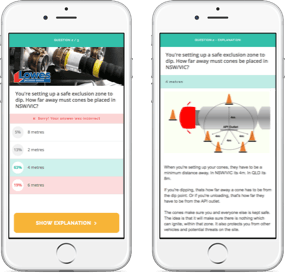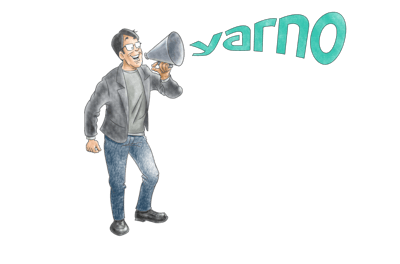With any new system introduced to a business (software or otherwise), there are bound to be a whole host of questions that people might ask – What’s this new tool? What does it do? Why should I use it? What’s in it for me? Is it worth the cost?
And we get it – sometimes, it can feel overwhelming, trying to explain the ins and outs to anyone and everyone. So, we’ve gone ahead and created a handy pack of answers to questions your employees or management teams might ask.
Things learners might ask
What's this Yarno thing?
Yarno is a learning platform that uses daily quizzes to help you become more confident and capable in your role. Using Yarno, you can improve your knowledge, track your learning progress and spark a bit of friendly competition between you and your coworkers.
What does Yarno stand for? Yeah-no?
This one is probably the question people ask first. I'll give you the TL;DR...
It isn't that clever per se – it plays off the Aussie saying 'to have a yarn' – and us Aussies love to add 'o' to the end of everything (servo, arvo, reno, avo, hospo..you get the idea). Also it was a name we could get the domain for. So all of that, and voila! Yarno.
What's in it for me?
This one is a little tricky. Simply telling someone what they'll benefit from doing something often doesn't inspire that 'aha' moment we're after.
We know Yarno improves knowledge, works to change employee behaviours and increases safety awareness and practice in business across industries. And while it's great that we know it, it's important for the learner to see and feel that improvement happening.
We believe the best way to do that is to just get stuck into Yarno – participate, make mistakes, learn something new, compete against your teammates and reflect on how far you've come.
But I don't have time...
It's easy for a busy employee to dismiss even the thought of 'training' with the 'I have no time' response.
And often, it's true – employees are time-stretched further than ever before. Training, unfortunately, one of those tasks that falls into the 'I'll do it eventually' basket.
That's exactly why we built Yarno the way we did. Quick, targeted quizzes that don't take more than a tea-break, a few minutes on the bus, or a walk around the office.
Things management might ask...
But our employees don't use our LMS anyway – why would they use Yarno?
We're not an LMS. We can't stress that enough. The LMS was created in the 1970's to 'store' learning and track completion.
Companies often went a little content-crazy, building up hundreds (if not thousands) of courses in their LMS. It soon became difficult for staff to find what they were looking for; searching through courses to find something relevant was a chore.
On top of that, the modern time-strapped knowledge worker just doesn't have the time time to peruse a thousand course catalogues in the hope they’ll find something that’s “just right”.
We already use e-learning. How are you different?
E-learning is traditionally delivered as modules that are completed by absorbing some information, then maybe answering some questions at the end of the pdf, digital course, slideshow or video.
We flipped that method around with Yarno.
Learners are asked questions to help them learn.
When you’re asked a question, your brain has to search for the answer. Having to recall what you know rather than simply reviewing it strengthens memory, increasing the chances you’ll remember it again. And when you’re unable to answer a question, you know you need to revisit the material or relearn it – which is where Yarno's explanation screens come in:

The explanation is where the learning really happens – learners receive immediate feedback on their answer, and can dig deeper into the details behind the topic.
Is there reporting?
Beyond supporting and coaching learners, managers have the important role of reporting Yarno results to other stakeholders in the business.
That's why we built the Yarno admin experience with the same level of thought, detail and ease of use as the learner experience. And it makes sense, seeing as Yarno admins (our true power users) use the platform the most out of any users.
The dashboard holds a range of detailed insights about:
- Question, topic and learner performance
- Overall, team and learner completion
- Performance over time
We're also currently working on some nifty advanced reporting for the more data-inclined – who want to go above and beyond with their reporting (stay tuned for that one!)
When will we see ROI?
Ah, the question on every executive-level stakeholder's lips: the elusive, the mystical... training ROI (<- that's a pretty detailed blog post by Lachy with some example calculations in it, by the way)
When this (admittedly hairy) question arises, be clear that:
- Training ROI is difficult to measure
- All aspects can be measured, though not all in direct financial return
- Different applications of Yarno will have different payback periods (onboarding, product knowledge, safety)
As an overall comment, we want to set our customers up for success. So, we make sure to start every engagement with a business case in mind.
In our experience it’s common for success measures to start quite vague, like:
- Reduce calls to the IT helpdesk.
So, we spend time whittling them down into a usable, SMART goal like:
- Reduce CRM calls to the IT helpdesk by 10% in 6 months, as staff actively use the CRM troubleshooting guide on the intranet.
See the difference? All variables can be accounted for, and it's easier to prove business impact.
That being said, the payback period of any training initiative is not only difficult to measure, but realistic measurement times are variable too.
For example – the time required to accurately measure change in turnover rate may differ from measuring a change in sales revenue as a result of improved product knowledge, or a decrease in customer churn/increase in NPS as a results of more consistent customer service training.
What about other questions?
There are bound to be more questions from different stakeholders in your business. But, don't fear! For anything you don't feel confident in answering, check out our support site, or contact us!

